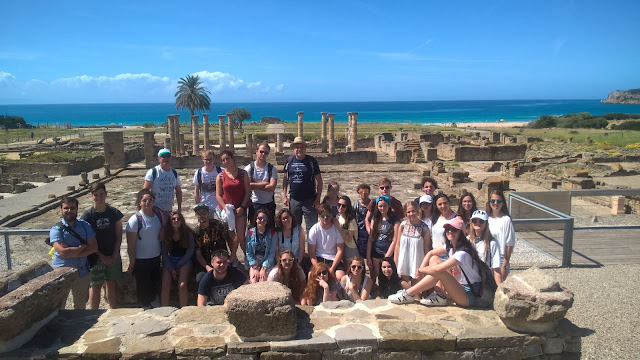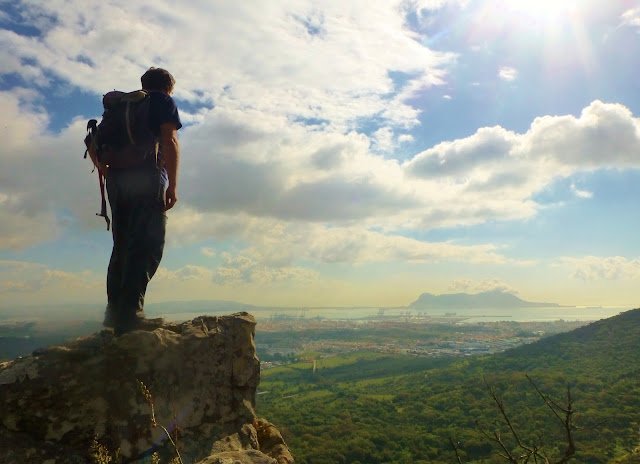I
admit it, I’m from the North. I like to know things are organized, I like to
know when we take the bus and where, what time we’ll be back and how much it
will cost. I like to know where I’ll put down my head at night, and exactly
what is expected from me. So you see: I’m from the North.
When
many years ago, I came to the Campo de Gibraltar for the first time, I was
quite an eye-opener for me. I had had an online contact with someone from a
school in Algeciras, and we’d set dates and had reached agreements. So there I
came, with 25 students in tow, who did not speak a word of Spanish, and who
were as dazzled by the light as me, as we drove from Malaga Airport along the
coast road to that End-of-the-World place, called Algeciras.
We
were dropped at a God forsaken place, safely guarded by high gates – locked for
all eternity, or so it seemed. Behind them we saw a dusty yard that looked
vaguely familiar to us – it had something of a schoolyard, but then one that
seemed to have been abandoned for ages.
Some plants seemed to struggle to survive in the cracks in the pavement;
their fight with sand and wind and the sun had not been easy. I had sent my flock off on a exploration
mission, but to my utter surprise they were all back in less than 15 minutes.
“Sir,” they asked, “Is it normal that everyone asks us if we want to buy
‘Drogas, drogas?’” I found myself lost
for an answer, I admit.
After
some time a teacher showed up, apparently surprised “we were there already”.
When after another hour, parents dropped in, one by one, the teacher got on a
forgotten stone lying around to try in vain to oversee her crowd, and started
asking “If anyone could accommodate a nice boy for three days?” and “A very
friendly girl for four days?”
My
heart missed a few beats that day, as I was abruptly woken up from my so
organized Northern dream. But then again, people answered “Yes, we can!” and
they laughed and kissed those pale-faced long-limbed Northerns, and led them to
waiting 4 by 4 cars. There was much shouting and waving and kissing and
laughing, and noise, lots of noise.
Well,
that was my first encounter with the Campo de Gibraltar, I think now 17 years
ago.
I
remember the laundry hung out between the houses. The broken tiles in the
municipal swimming pool, where the changing cubicles were rotten to the core,
but where we had to wear a ridiculous cap to get into the water. I remember
nobody could tell me where to get public transport to get to the airport: “It’s
somewhere in this street, probably.”
And
most of all, I remember how African it all was to me. Nobody on a motorbike was
wearing a helmet, nobody cared about parking double, nobody seemed to mind the
rubbish or the weeds growing around the pavement.
And
yet… Over the years I have come back, sometimes a few times a year, sometimes
only once. I have seen how things have changed. Maybe I am the one who has
changed, who has learnt to see other things, or see things in a different
light.
I
have noticed how things get better organized. How people are in time. How they
keep their promises. How open and friendly everyone is to each other. In my
country, we speak about it (the “inclusive society”), but it is only a
theoretical concept, I feel; here it is real.
I
have heard so many times here in the north how people in the south are lazy,
and sit in the sun the whole day. But what I see with my own eyes is how everyone
works hard; how they start at the same time as us, how they take a break when
the sun is at it hottest, but how they continue late into the night – when I’m
already dreaming the sweetest of dreams.
I
remember the first time I came to Spain (I admit it, it was in the previous
century), hardly anyone spoke any English. I remember this English teacher in
Catalunya who was about as good at English as my students of the second
year. I remember in my first exchange in
the Campo de Gibraltar, almost no students spoke any English – and as mine
didn’t have any Spanish lessons, communication was often a matter of sign language
and lots of fantasy… How things have
changed! Now it’s easy to find people who express themselves in the language of
Shakespeare. More and more teachers, more and more young students, and even
sometimes the odd parent too.
And
of course, the things that do not change. The stunning scenery: the majestic
mountains, the lush valleys, and the deep blue of the sea. The food: the tapas
that come in long lists, the wine that should be savoured slowly, and the
variety of fruit unknown to us here in the north. The way people live in
harmony with nature, gathering caracoles in
the mountains, or setas or asparagus.
But
the best of all always is the warmth of the people, the flair of passion when
they discuss life, or politics, or – with equal seriousness – which kind of jamón serrano is the best. The earnest
joy when they meet old acquaintances in the street, the way a friend of a
friend almost automatically is your friend, the naturalness of sharing.
Because
that is what I most like about Spain: how people share.
So
yes, I’ve lost part of my heart in Andalucía, and no matter how often I go back
trying to find it again, I never can. On the contrary, every time I lose some
more of it!
(Bart George es
profesor del Broederschool de Roeselare, Bélgica, y viene organizando desde
hace años intercambios de estudiantes con el IES Sierra Luna de Los Barrios y
anteriormente con otros centros educativos del Campo de Gibraltar)


















































































